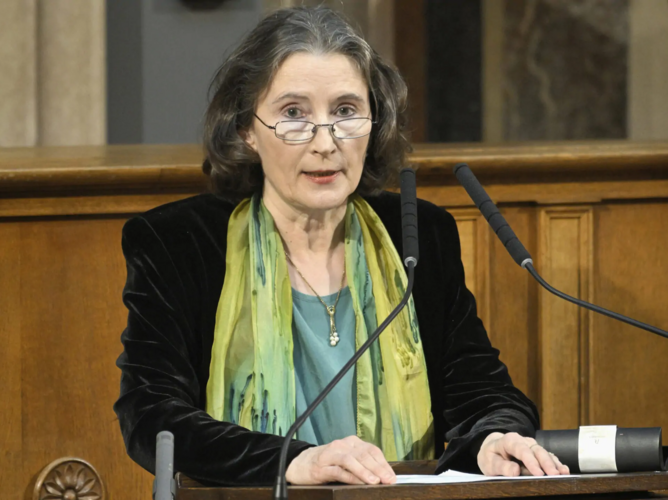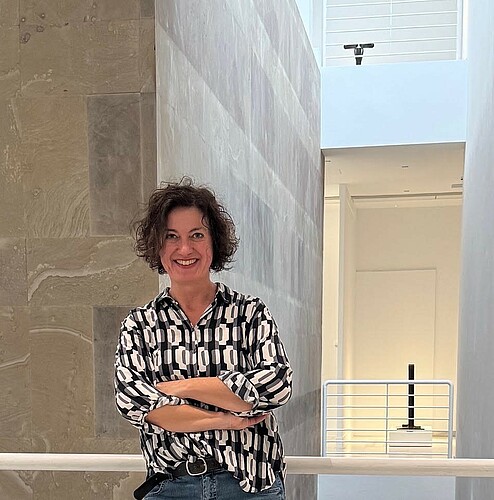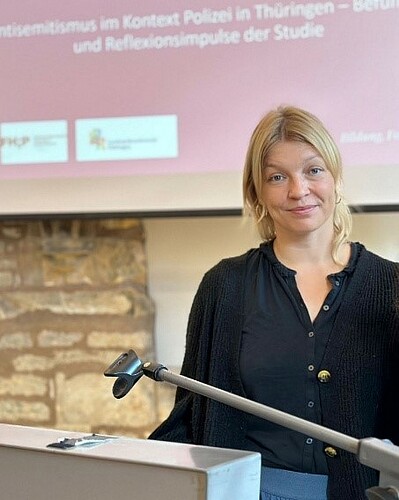Events, exhibitions, performances, concerts, and artistic projects
Here, we present various formats that not only provide significant impulses and strengthen the dialogue on antisemitism but also demonstrate how creative, interactive and scientific approaches can foster a deeper understanding of the complex societal challenges associated with addressing antisemitism, while supporting long-term prevention efforts.
Launch of OnCurating Publication #62 in Berlin
Friday, November 28, 2025, 7:00 PM in Berlin
Please register for this venue here.
(The exact location will be sent via email to registered participants.)
OnCurating # 62: Let’s Talk About … Anti-Democratic, Anti-Queer, Misogynist, Antisemitic, Right-Wing Spaces and Their Counter-Movements
With contributions by:
Dagim Abebe (on Wendimagegn Belete); Inke Arns; Artists at Risk (AR: Marita Muukkonen and Ivor Stodolsky); Jonny Bix Bongers; Jutta Ditfurth; Fabienne Dubs and Jana Kurth (on Maria Eichhorn); Michaela Dudley; Sergio Edelsztein; Ulrich Gutmair (on Hamza Howidy), Ana Hoffner; Leon Kahane; Hadas Kedar (on Khader Oshah); Veronika Kracher; Daniel Laufer (on Nir Evron, Omer Krieger and Ariel Reichman); Ahmad Mansour; Oliver Marchart; Michaela Melián; Ruth Patir; Doron Rabinovici; Dorothee Richter (on a project curated by Elena Levi, Ronald Kolb, Dorothee Richter, Rotem Ruff, Maayan Sheleff and Hillit Zwick); Maria Sorensen; Nora Sternfeld; Simon Strick; Klaus Theweleit; Stephan Trüby.
You find more information here.
Here you can find the publication.
Lecture Series at UdK Berlin: Antisemitism at Universities – Reality, Reflection, Reaction
This lecture series provided a space for in-depth reflection and constructive exchange on antisemitism. Antisemitism is also a reality at universities—whether in academic debates, student initiatives, or everyday campus life. The series “Antisemitism at Universities – Reality, Reflection, Reaction” examined current scholarly perspectives on the topic and presented both analytical and practice-oriented approaches to combating antisemitic patterns of thought and behavior.
The series opened with a lecture on the empirical study of antisemitism: When is it Antisemitism? Academic Answers to a Frequently Asked Question (Prof. Dr. Dr. h.c. Monika Schwarz-Friesel, TU Berlin). This was followed by Antisemitism and Intersectionality: Critique and New Perspectives (Prof. Dr. Karin Stögner, University of Passau).
Practical strategies for documenting and combating antisemitism were the focus of the third event: The Research and Information Office on Antisemitism (RIAS Berlin) and Mobile Counseling Against Right-Wing Extremism (MBR Berlin) presented civil society approaches addressing the documentation of antisemitic incidents, support for those affected, and dealing with antisemitism in universities and cultural institutions.
Workshop: Antisemitic Incidents in Berlin with a Focus on Universities by Julia Kopp (RIAS Berlin) and Matthias Müller (MBR Berlin).
The series concluded with an analysis of the impact of October 7, 2023, on Jewish and Israeli communities in Germany. The lecture Antisemitism in the Institutional University Context – Traditions, Blind Spots, and Current Research examined how antisemitism has changed in everyday university life before and after this date and the challenges that have emerged as a result (Prof. Dr. Friederike Lorenz-Sinai, University of Applied Sciences Potsdam).
The lecture series was organized by Dr. Michaela Conen, Process Coordinator for Antisemitism Prevention at the Berlin University of the Arts (UdK), with support from the MFFB. Below you will find the recorded online lectures.
Lecture from May 12, 2025: When Is It Antisemitism? Scholarly Answers to a Frequently Asked Question
For years, claims such as "there is not enough research yet" or "we lack a precise scientific definition of antisemitism" have shaped the discourse and debates surrounding contemporary antisemitism. In this way, the extensive existing research on the topic is overlooked, and the much-needed enlightenment, as well as the societal fight against the growing hatred of Jews, is deferred to an indefinite future. In this lecture, using data-rich and scientifically validated findings from both historical and contemporary empirical research, the question of what antisemitism is (and what it is not), how it manifests, and how to recognize and deconstruct antisemitic attitudes will be discussed.
Link to the online presentation
Prof. Dr. Dr. h.c. Monika Schwarz-Friesel
Prof. Dr. Dr. h.c. Monika Schwarz-Friesel, expert on antisemitism and cognitive scientist at the Technical University of Berlin; Chair at the Institute for Language and Communication. Her book publications include: Contemporary Antisemitism, a Phenomenon of the Center, Educated Antisemitism, The Language of Antisemitism in the 21st Century, Antisemitism on the Internet, Toxic Language and Mental Violence: How Antisemitic Thought and Emotional Patterns Have Shaped Our Communication for Centuries.
Lecture from May 19, 2025: Antisemitism and Intersectionality. Critique and New Perspectives
After October 7, it became clear that antisemitism is a significant gap within much of intersectional feminism. This reached a point where Jewish people and Israelis were denied intersectional solidarity. In a new approach to intersectional ideological critique, the lecture will analyze the interconnections between antisemitism, racism, and sexism.
Link to the online presentation.
Prof. Dr. Karin Stögner
Prof. Dr. Karin Stögner is a Professor of Sociology at the University of Passau. She is the author of Antisemitism and Sexism: Historical-Social Constellations (Nomos 2014) and co-editor of Critical Theory and Feminism (Suhrkamp 2022).
Lecture from June 4, 2025: Antisemitism in the Institutional Context of Universities – Traditions, Gaps, and the State of Research
In this lecture, the question will be explored of how antisemitism manifests in the institutional everyday life of universities both before and after October 7, and how it impacts Jewish and Israeli communities in Germany. The lecture will address societal traditions in dealing with Jews and antisemitism in contemporary society, introducing the analytical category of institutional antisemitism. It will then present and discuss findings from current studies on experiences of antisemitism in the university context.
Link to the online presentation.
Prof. Dr. Friederike Lorenz-Sinai
Prof. Dr. Friederike Lorenz-Sinai is a Professor of Social Work Methods and Social Work Research at the University of Applied Sciences Potsdam. Her research focuses on the processing of (sexualized) violence, everyday experiences in the prison system and perceptions of prison architecture, institutional antisemitism, as well as the impact of October 7, 2023, on Jewish and Israeli communities in Germany. Together with Marina Chernivsky, she co-leads a research area at the Competence Center for Antisemitism-Critical Education and Research. Current publications, each co-authored with Marina Chernivsky, include: Institutional Antisemitism as an Analytical Category – Traditions, Findings, and Research Gaps (2025); Analysekategorie institutioneller Antisemitismus“How come you don’t say anything when Jewish women are raped?” – Sexualized Violence in the Context of October 7 from Jewish Perspectives in Germany (2025), in: Glöckner, Olaf/Jikeli, Günther (eds.): Antisemitism in Germany After October 7. Georg Olms Verlag: Hildesheim; October 7 as a Turning Point for Jewish Communities in Germany (2024), Der 7. Oktober als Zäsur für jüdische Communities in Deutschland in: APuZ - Aus Politik und Zeitgeschichte: Antisemitismus, 74th year, 25-26 2024, pp. 19-24.
Jewish Art School Berlin
The Institute for New Social Sculpture, in cooperation with the Berlin University of the Arts and the Jewish Student Union of Germany, is founding the Jewish Art School Berlin (JKB). This institution offers Jewish and antisemitism-critical students and young adults an innovative platform for artistic development and critical engagement.
The JKB is led by internationally renowned artists such as Victoria Hanna, David Adika, and Yehudit Sasportas. Through masterclasses and workshops spanning various disciplines—from performing to visual arts—Jewish and antisemitism-critical students and young adults will be supported in their artistic growth.
The collaboration with the University of the Arts Berlin (UdK Berlin) further supports the project.
Interdisciplinary Perspectives on Contemporary Curatorial Practices and Societal Transformations
The OnCurating Academy offers a space for experimental, critical, and meta-curatorial practices, pursuing an interdisciplinary approach that links diverse fields of knowledge. Under the direction of Dorothee Richter, the team explores profound transformations in contemporary societies, the restructuring of labor processes, cultural policy, and the political dynamics of inclusion and exclusion. In addition, it raises questions that emerge at the intersections of different disciplines and societal discourses.
The project "Let’s talk about ... anti-democratic, anti-queer, misogynist, antisemitic, right-wing spaces and their counter movements" by the OnCurating Academy was developed in cooperation with Daniel Laufer, artist and founding curator of DAGESH – Jewish Art in Context, and Dr. Michaela Conen from the Berlin University of the Arts (UdK). DAGESH fosters the visibility of diverse artistic expressions by Jewish artists and, since its founding, has served as a platform and network exploring a contemporary, self-confident, and forward-looking Jewish identity.
The project “Let’s talk about …”, which addressed anti-democratic, anti-queer, misogynist, antisemitic, and far-right spaces as well as their counter movements, will conclude with a publication to be released later this year. The exact release date will be announced here in due course.
Launches:
Launch University of Kassel Oct 22 6 pm
Launch University of Stuttgart* Nov 5th 6 pm
Launch Berlin Nov 28th 7 pm
Please register for each venue here
Prof. Dr. Dorothee Richter is an author, art historian and curator of contemporary art. She is Professor of Contemporary Curating at the Department of Fine Art at the University of Reading. She is the founder and editor of the Zurich-based publication platform OnCurating and the OnCurating Academy Berlin. She is a Fluxus specialist, presenting a film on Fluxus, Flux Us Now, Fluxus explored with a camera, she was the head of the CAS/ MAS in Curating at the Zurich University of the Arts between 2005 - 2024. The archive she co-founded Curating Degree Zero Archive is now based at the library of the ZHdK. She has collaborated with the Migros Museum, the Kunstmuseum Basel, the Künstlerhaus Stuttgart, documenta fifteen, the Kunsthaus Zürich, the CCA Tel Aviv, ARCO Seoul, as well as with other institutions.
Daniel Laufer (b. 1975, Hannover, lives and works in Berlin) creates hybrid film installations that merge cinematic language with visual art. His dreamlike, non-linear narratives explore memory, myth, and storytelling, destabilizing temporal logic and generating immersive spaces where perception itself becomes a stage. Drawing on a media-archaeological approach, he interweaves historical and contemporary filmic techniques with language, painting, scenery, and performance into intermedial constellations.
Laufer is an artist and curator, and teaches artistic and aesthetic practice at Leuphana University Lüneburg and at the State Academy of Fine Arts in Karlsruhe.
He has exhibited internationally, with presentations at Artists Space, New York; Jewish Museum Berlin; Jewish Museum Frankfurt am Main; Kunstmuseum Bonn; Kunstverein Bonn; Kunstverein Hannover; Kunstverein Harburger Bahnhof; and KW Institute for Contemporary Art, Berlin, among others. Forthcoming solo exhibitions include Kunsthalle Lingen and Rib Rotterdam (2026). He has also published in Texte zur Kunst and the Journal of the Dubnow Institute, among others.
Dr. Michaela Conen is an expert in antisemitism prevention. She serves as the President’s Commissioner for Antisemitism Prevention at the Berlin University of the Arts (UdK) and heads the Strategic Marketing unit.
The project is funded by the “Action Fund Against Antisemitism” of the Senate Department for Culture and Social Cohesion, Division of Culture.


